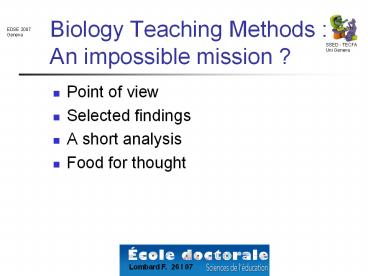Biology Teaching Methods : An impossible mission ? - PowerPoint PPT Presentation
Title:
Biology Teaching Methods : An impossible mission ?
Description:
Biology Teaching Methods : An impossible mission ? Point of view Selected findings A short analysis Food for thought Point of view Theoretical context Sources ... – PowerPoint PPT presentation
Number of Views:234
Avg rating:3.0/5.0
Title: Biology Teaching Methods : An impossible mission ?
1
Biology Teaching Methods An impossible mission
?
- Point of view
- Selected findings
- A short analysis
- Food for thought
2
Point of view
- Theoretical context
- Sources
- Education in Biology literature
- Biology / Science in Educational Science
literature - Methods
- Huberman Miles
3
Selected Findings
- Inquiry (USA), science of conclusions / building
knowledge - Benchmarks for Science 2061 (AAAS)
- Hands-on, Active, Lab-centerd (e.g. Allen)
- La main à la Pâte (F) (Charpak)
- Authentic learning (Hammer, Sandoval)
- High Level Thinking, Engaged, Deep thinking
(e.g.. Handelsman, J) - NOS (Lederman)
- Misconceptions, conceptual change (e. g. Giordan)
- Lived curriculum (Wright, R. L., Klymkowsky)
- Search for Meaning, ethics, STS (Kachan)
4
A short analysis
- Objectives
- Facts of B
- Deep Knowledge of B
- Methods of B
- Episteme of B
- Motivation of B
5
Food 4 thought 3 main issues
- 1 Curriculum fulfilment vs most other objectives
- 2 Student efficiency measure
- 3 Assessment alignment with methods
6
The End
- Thankyou
- for your attention !
7
References
- Design Based Research Collective. (2003).
Design-Based Research An Emerging Paradigm for
Educational Inquiry. Educational Researcher,
32(1), 5-8. - Gould, S. J. (1979). Ever since Darwin
reflections in natural history. New York W.W.
Norton. - Hammer, D. (1995). Student inquiry in a physics
class discussion. Cognition and Instruction,
13(13), 401-430. - Horman, J. (2005). Une exploration de
l'interaction sociale en ligne lors de la
réalisation d'activités d'apprentissage
collaboratif dans deux espaces interactifs un
site internet et des wikis., Université Laval. - Maulini, O. (2004). L'institution scolaire du
questionnement. Interaction maître-élèves et
limites de la discussion à l'école élémentaire.
Unpublished Thèse de doctorat en sciences de
l'éducation, Université de Genève. - Perrenoud, P. (1995, 21 août 2006). Réussir ou
comprendre ? Les dilemmes classiques dune
démarche de projet. from http//www.unige.ch/fapse
/SSE/teachers/perrenoud/php_main/php_1998/1998_39.
html - Ryan, R. M., Deci, E. L. (2000).
Self-Determination Theory and the Facilitation
of Intrinsic Motivation, Social Development, and
Well-Being American Psychologist 55(1), 68-78. - Sandoval, W. A., Bell, P., Coleman, E., Enyedy,
N., Suthers, D. (2000, April 25). Designing
Knowledge Representations for Learning Epistemic
Practices of Science Paper presented at the
Designing Knowledge Representations for Learning
Epistemic Practices of Science Annual
conference of the American Educational Research
Association, New Orleans. - Sandoval, W. A., Daniszewski, K. (2004 ).
Mapping Trade-Offs in Teachers' Integration of
Technology-Supported Inquiry in high School
Science Classes. Journal of Science Education and
Technology, 13(2). - Sandoval, W. A., Reiser, B. J. (2003).
Explanation-Driven Inquiry Integrating
Conceptual and Epistemic Scaffolds for Scientific
Inquiry Science Education, 88(3), 345-372. - Scardamalia, M., Bereiter, C. (1994). The CSILE
project Trying to bring the classroom into
world. In M. K. (Ed.), Classroom Lessons
Integrating Cognitive Theory and Classroom
Practice (pp. 201228). Cambridge, MA MIT Press
/ Bradford Books. - Scardamalia, M., Bereiter, C. (1996). Engaging
Students in a Knowledge Society. Educational
Leadership, 54(3), 6-10. - Scardamalia, M., Bereiter, C. (2002). Knowledge
Building. In Encyclopedia of Education (Second
Edition. ed.). New York Macmillan Reference,
USA. - Schön, D. A. (1994). Le praticien réflexif, à la
recherche du savoir caché dans l'agir
professionnel. Montréal Logiques. - Turkle, S. (1995). Life on the Screen. Identity
in the Age of the Age of Internet. . New York
Simon and Schuster. - Viau, R. (1997). La motivation en contexte
scolaire. (2e éd. ed.). Bruxelles De Boeck.

